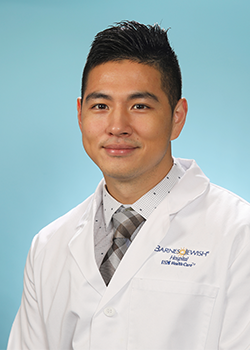Peter Park

For Dr. Peter Park, BMSc’14, the drive and desire to help people has always come naturally.
Currently in his third year of a four-year residency program focused on physical medicine and rehabilitation at Washington University in St. Louis, Missouri, Park is planning to pursue a pain medicine fellowship before completing his postgraduate training in 2024.
“It's a specialty that works with people that have a lot of disabilities, like spinal cord injury, stroke and traumatic brain injury, as well as a lot of musculoskeletal medicine,” he said. “I also focus on sports medicine, back pain, shoulder pain and hip pain. It's very rewarding to be in a field that allows me to help people with their suffering.”
Park immigrated with his family to Canada from South Korea when he was 10 years old and says he was drawn immediately to volunteer for a position with the International Peer Guide program at Western, an opportunity that played a big role in his life for three years. As a peer guide, Park acted as a resource, mentor and support system for new students at Western.
“I wanted to make the Western student experience for exchange students and international students comforting and positive. I felt like I could offer my perspective being an immigrant myself and that people would benefit from that,” he said.
“I remember first coming to Canada and just looking around at kids during recess, all running when the bell rang and rushing to class and knowing where to go and knowing everyone around them. I remember thinking I looked very different from everyone else and looking around and feeling lost. If you're not comfortable with your environment around you, then things like studying will obviously be even more challenging. I wanted to be someone who could empathize with their situation and just try to be a friend and help them in any way that I could, to facilitate that transition for them.”
Park says the skills he developed as a peer guide have had a big and direct impact on his experiences and career since he graduated, including the year he spent abroad teaching.
“I learned how to communicate effectively because a lot of people had different language backgrounds and you had to be conscious of speaking in a way that they could understand. That helped me perform my role, I think, better as an English teacher in Spain and I do that now as a physician talking to patients.”
As he looks to the future, he's grateful he had the opportunity to engage with people from around the world while at Western.
“I think everyone's pretty familiar with how globalized our world has gotten. Being familiar with a variety of ethnic backgrounds, cultural backgrounds and being sensitive to people's norms, and how they communicate and carry themselves, helps me to be able to interact with everyone better, regardless of their background, or their language. I have so many incredible memories and lasting relationships that are very special and genuine.”


